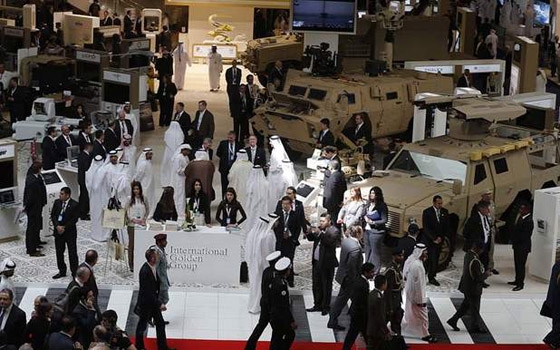The spate of large defense contracts recently awarded to Abu Dhabi-based firms, together with the emirate’s growing success in attracting investment for technology, has highlighted the key role earmarked for the industry in the emirate’s long-term plans to diversify its economy.
Local firms fared particularly well at the International Defense Exhibition and Conference (IDEX), which Abu Dhabi hosted in late February. Contracts signed at the conference, which attracted 80,000 visitors from around the world, were valued at Dh15bn ($4.08bn), with UAE defense orders accounting for Dh4.9bn ($1.33bn) of the deals.
Among the largest was a Dh1.9bn ($0.52bn) contract awarded to the Advanced Military Maintenance Repair and Overhaul Centre (AMMROC), a subsidiary of Mubadala Development Company an investment company owned by the government of Abu Dhabi, to provide the UAE Armed Forces with aircraft management, maintenance and repair services. The UAE Armed Forces also undertook to buy 1800 UAE-made vehicles from Nimr Automotive, part of the Abu Dhabi-based holding firm Tawazun.
The market for defense equipment and services in the Gulf is expanding as states look to reduce dependence on arms imports while beefing up security. Defense spending in the region is forecast to top Dh367bn ($99.92bn) by 2020, according to industry estimates.
In its efforts to tap into rising demand, Abu Dhabi has increased its focus on facilitating knowledge transfer across the defense industry, primarily through joint ventures. Tawazun announced in early February, for example, that it was teaming up with Saab to create a facility for the development, manufacture, assembly and integration of radar systems.
The deal, which marks the first of its kind in the Gulf region, is typical of the type of venture the emirate is expected to drive forward. According to Ali al Dhaheri, general designer at the privately-owned, Abu Dhabi-based ADCOM Systems, which makes and exports drones, “[Our country is] small and all our manufacturing will probably be high-tech and small-scale. And services will also be part of it.”
Defense industries are proving to be strong engines for the emirate’s domestic economy, with figures from the Statistics Centre—Abu Dhabi (SCAD) showing that public administration, defense and compulsory social security accounted for 23.5% of Abu Dhabi’s labor force in 2011, employing six out of 10 nationals.
While the signing of new contracts will provide a major boost to the emirate’s defence industry, other segments are also set to gain, including the fast-evolving niche of cybersecurity. Boeing and SecureTech, a major systems integrator in physical security and ICT domains, signed an agreement at IDEX that will see them jointly provide cybersecurity solutions for data and national infrastructure protection within the UAE and throughout the Persian Gulf.
Khaled Obaid Al Othman Al Ali, CEO of Al Fahad, believes improvements to the UAE’s fibre network have paved the way for expansion in the cyber security segment. “As the public sector continues to invest in eGovernment systems, there will subsequently be a tremendous opportunity for those companies who can offer IT security solutions,” he said.
Increased defense investment is also set to benefit aerospace manufacturing, on the back of Abu Dhabi’s plans to carve itself a niche in the manufacture and maintenance of civil and military aerospace equipment. AMMROC’s CEO, Fahed Al Shamesi, told OBG, “The development of an aerospace industry will leverage on the strengths and assets that already exist in the UAE. Local companies will establish themselves by drawing upon the domestic market first and then expanding to international markets.”
A Dh4.9m ($1.33m) agreement signed between Mubadala Aerospace and UAE University (UAEU) at IDEX is set to provide training for Emirati technicians to work at Strata’s aircraft composite production facility. However, industry players are also keen to give students an insight into the opportunities aerospace offers at an earlier age.
“This sector creates high-end technical jobs, and we believe that this is one of the most attractive industries for UAE nationals to work in,” Homaid Al Shemmari, executive director of Mubadala Aerospace, told OBG. “UAE nationals graduating from high school are looking for employment options, so we are trying to raise awareness in high schools and develop a career path and associated educational programs that will encourage them to explore the aerospace industry.”
Analysts have suggested that Abu Dhabi’s defense sector will need to expand its clientele beyond the UAE armed forces to cement its long-term commercial viability. For now, however, a growing market for defense products at home, together with a wealth of technology and knowledge transfer opportunities, signals a positive outlook for the industry.
Oxford Business Group
16 April






















































